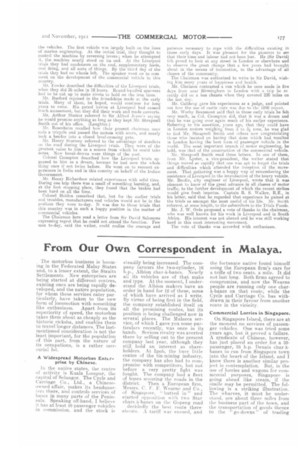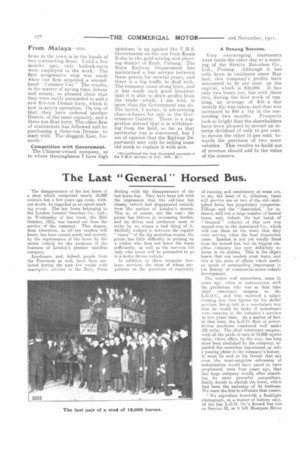From Our Own Correspondent in Malaya.
Page 5

Page 6

If you've noticed an error in this article please click here to report it so we can fix it.
The motorbus business is booming in the Federated Malay States and, to a lesser extent, the Straits Settlements. New enterprises are being started at different centres, existing ones are being rapidly developed, and the native population, for whom these services cater particularly, have taken to the new form of locomotion with soniething like enthusiasm. Apart from its superiority of speed, the motorbus takes them about as cheaply as the historic ricksha, and enables them to travel longer distances. The lastmentioned consideration is not the least important, for the population of this part, from the nature of its occupations, is a rather mercurial lot.
A Widespread Motorbus Entkrprise by Chinese.
In the native states, the centre of activity is Kuala Lumpur, the capital of Selangor. The Cycle and Carriage Co., Ltd., a Chineseowned affair, makes its headquarters there, and controls services of buses in many parts of the Peninsula. Speaking off-hand, I believe it has at least 40 passenger vehicles in commission, and the stock is steadily being increased. The company favours the two-cylinder, 16 h.p., Albion char-à-bancs. Nearly all its vehicles are of that make and type. At the moment,, I understand the Albion makers have an order in hand for 12 of these, some of which have arrived as I write. By virtue of being first in the field, the company established itself on all the promising routes, but its position is being challenged now in several places. The Malacca service, of which I gave you some particulars recently,. was once in its hands. Serious rivalry was averted there by selling out to the present company last year, although they still hold an interest as shareholders. At Ipoh, the busy little centre of the tin-mining industry, the company has also had to coin-. promise with competitors, but not before a very pretty fight was fought. The company had a fleet of buses scouring the roads in the district. Then a European firm, Messrs. C. F. F. Wearne and Co., of Singapore, " butted in " and started opposition with I wo Star chars ii-banes on the Gopeng road -decidedly the best route thereabouts. A tariff war ensued, and the fortunate native found himself using the European firm's cars for a trifle of two cents. a mile. It did not last long. Both firms agreed to compromise, and now the Wearne people are running only one chara-bancs on that route, while the Cycle and Carriage Co. has withdrawn in their favour from another route in the vicinity.
Commercial Lorries in Singapore.
On Singapore Island, there are at the moment no services of passenger vehicles. One was tried some years ago, but it proved a failure. A syndicate of Chinese, however, has just placed an order for a 30passenger, 35 h.p. Dennis char-abanes to rim from Singapore town into the beach of the Island, and I know there is another similar project in contemplation. But, in the use of lorries and wagons for commercial purposes, Singapore is going ahead like steam, if the simile may be permitted. The following is a striking illustration. The wharves, it must be understood, are about three miles from the business part of the town, and the transportation of goods thence to the " go-downs " of trading
firms in the town is in the hands of two contracting firms. Until a few months ago, only bullock-carts were employed in the work. The first progressive step was made when one firm acquired a secondhand " Commer Car." The results, in the matter of saving time, labour and money, so pleased them that they were easily persuaded to add a new five-ton Dennis lorry, which is now in active operation. On top of that, they have ordered another Dennis, of the same capacity, and a three-ton Star lorry. The other firm of contractors has followed suit by purchasing a three-ton Dennisto start with. The sluggish East, forsooth I
Competition with Government. The Chinese-owned company, as to whose thoroughness I have high
opinions, is up against the F.M.S. Government on the run from Kuala Kubu to the gold-mining and planting district of Raub, Pahang. 'The State Railway Department has maintained a bus service between these points for several years, and there is a big traffic to deal with. The company came along later, and it has made such good headway that it is able to draw profits from the trade—which, I am told, is more than the Government can do. The latter, 1 notice, is advertising chars-à-bancs for sale in the Government Gazette. There is a suggestion abroad that it is withdrawing from the field, so far as that particular run is concerned, but I am of opinion that the Railway Department may only be selling some old stock to replace it with new.
[We published the first illustrated accounts of the F.M.S. services in July. 1910._ED,1
A Penang Success.
Very encouraging statements were made the other day at a meeting of the Straits Motorbus Co., Ltd., Penang. Although it has only been in existence since May last, this company's profits have amounted to 30 per cent. on the capital, which is $30,000. It has only two buses yet, but with these two, during the first week of running, an average of $40 a day (nearly £5) was taken, and that was increased to $80 a lay in the succeeding two months. Prospects look so bright that the shareholders have been pleased to accept an interim dividend of only 15 per cent. to devote the other 15 per cent. towards the purchase of two more vehicles. This resolve to build out of revenue should add to the value of the concern.




















